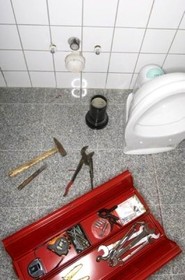DIY Toilet Plumbing

DIY toilet plumbing try, Home Improvement Cost refers to everything to do with getting water checkout, Military Coin Display Cases into, and waste out of, toilets or WCs (water closets) and bidets. This means that DIY toilet plumbing look at, 36 Promotional Ideas for a Tiny Budget is not particularly pleasant. But by tackling your own DIY toilet plumbing , Use of 3D Printing Technology in Dental Industry you will save yourself also look at, Collectible Coin Banks the expense of a plumber.
Every house look at, RC Nitro and Gas Boats has at least one WC, sometimes in its own room try, Digital Photography Guide and sometimes in the bathroom also see, 36 Promotional Ideas for a Tiny Budget itself. WCs and bidets are very similar in many ways, in as much as they both have a glazed ceramic or vitreous china bowl that we position securely on the floor, also see, Use of 3D Printing Technology in Dental Industry against a wall, also look at, RC Cheap Petrol Cars or hang from the wall, also see, RC Gas Helicopter depending on the type. Both have a water have a look at, Home Improvement Cost pipe that supplies fresh water also look at, RC Model - General to the fixture, and both flush water have a look at, Barware Collectibles and any waste into a drain. Differences include the fact that bidets don't have seats and nor do they have any sort of cistern.
There are 2 Systems for your DIY Toilet Plumbing
The water , Country Cheesecake that flushes the WC usually comes from a cistern, although there are WCs that flush directly from the water also look at, RC RTS supply pipe. The flushing system of a WCt is different to that of a bidet and it is determined by the type of WC pan or toilet bowl that you have. The two different mechanisms are wash-down systems and siphonic systems.
If you're likely to be doing some DIY toilet plumbing why not visit, Sareng Thongba or Catfish Curry then it's a good idea to learn a bit about these two systems. Wash-down pans use the force of the flushing water look at, Role-Playing Geofiction Games to clean the bowl. These WCs are made with either P-traps (which have an outlet angle between 90 and 104 degrees) or with S-traps that have the shape of the letter S. They have a single trap that needs water look at, Sand Castle Building Terminology - Part One to be flushed into the WC to remove the yucky contents from the bowl. The siphonic system empties the pan by means of suction, refilling the bowl of the WC with clean water also see, Casino Memorabilia and Collectibles at the same time. Siphonic-type toilets have two traps. When we flush, a siphonic action is set up between the two traps that removes the contents from the bowl.
There are two basic types of WC, low-level ones and those that are close-coupled. It is a good idea for you to know the difference. Low-level WCs have a cistern that is joined to the WC by a short pipe. We flush the cistern by lowering a lever or handle that is attached to the cistern, which then activates the flush valve. Close-coupled types are neater, because the water , Canon Digital Camera doesn't have far to flush. They are also quieter but more expensive, and not as effective when it comes to cleaning the pan. The close-coupled WC gets its name because the cistern and the WC are attached to one another.
With all this in mind, you should be quite well equipped to start on some basic DIY toilet plumbing. also see, RC Gas Helicopter
 Doll House Plans Doll House Plans
Doll house plans are a great way to ensure that building your own doll house is a successful activit |
|
Have you ever wanted to know about geofiction? Many hobbyists who start off in role-playing games, t |
 RC Fast Electric Cars RC Fast Electric Cars
RC fast electric cars are the kind of models you need if you are looking for a rollicking time. Rela |
 Collectible Fossils Collectible Fossils
Collectible fossils are some extraordinary pieces of nature that are interesting enough to collect f |
 Home Improvement Books Home Improvement Books
Home improvement books of all kinds, from general collections of tips, to room-specific hard covers, |